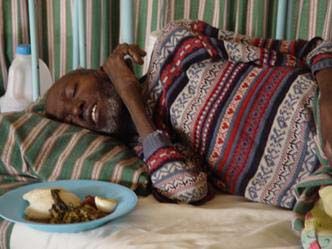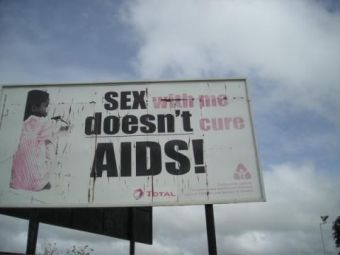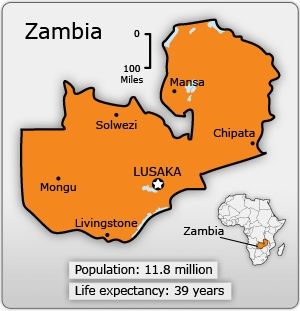
Publisher:
Bonnie King
CONTACT:
Newsroom@Salem-news.com
Advertising:
Adsales@Salem-news.com

~Truth~
~Justice~
~Peace~
TJP
Feb-02-2012 18:20

 TweetFollow @OregonNews
TweetFollow @OregonNews
In Zambia, 1 in 4 Circumcised Men Resume Sex Before Wounds are Healed
Michael Carter Special to Salem- News.comZambian Study reveals how circumcision could in fact drive the AIDS rate rather than reverse it.
 Zambia's AIDS rate is off the charts and false illusions given to men about circumcision are making problems worse. Photo courtesy: core.org.cn |
(WASHINGTON D.C.) - Approximately a quarter of men undergoing circumcision resume sexual activity before their wounds have fully healed, Zambian research published in the online edition of AIDS shows.
Most of the men reporting the early resumption of sexual activity engaged in unprotected sex, often with multiple partners.
The investigators calculated that early resumption of sexual activity at this level could undermine the protective effect of circumcision against HIV at a population level. Indeed, if the proportion of men engaging in sex during wound healing increased to 30%, then circumcision would lead to more new HIV infections in women than it would avert.
“The prevalence of sexual activity and, in particular, risky sex during the wound healing period in the Zambian context is not trivial,” comment the investigators. “Even relatively small increases in early sex can have a deleterious impact on women to a point where new infections exceed averted infections in that year.”
A number of randomised controlled trials have shown that circumcision can reduce a man’s risk of infection with HIV by approximately 66%. It has been calculated that universal male circumcision in sub-Saharan Africa could avert 2 million new HIV infections in the first ten years. Male circumcision programmes are therefore being implemented in a number of countries in the region with generalised HIV epidemics.
 |
Zambia embarked on a national circumcision programme in 2007. HIV-negative men aged between 13 and 39 years are targeted in this programme and in 2010, some 61,000 men underwent circumcision.
However, the protective effects of circumcision suggested by randomised trials can be undermined by a number of factors. One of the most important is early resumption of sexual intercourse before the wounds from surgery have healed.
Men undergoing circumcision are therefore counselled not to resume sexual activity until six weeks have passed.
Investigators wished to establish how many men were having sex within this six-week period. They also wanted to see if any factors were associated with the early resumption of sexual activity, and if sex in the post-operative period would have wider implications for the impact of circumcision programmes on the prevention of new HIV infections.
A total of 225 men were interviewed about their sexual behaviour before circumcision and again six weeks later.
 |
The men had a mean age of 21 years. At baseline they reported a mean of three lifetime sexual partners and 44% had a regular partner. Unprotected sex in the four weeks before circumcision was reported by 22% and 10% had been diagnosed with a sexually transmitted infection within the past twelve months.
Just under a quarter (24%) of men reported resuming sex within the six-week healing period. Almost half (46%) of these men had sex within the first three weeks after surgery.
Moreover, 81% of men resuming sex during the healing period reported unprotected sex, and 32% said they had had unprotected intercourse with two or more partners.
Early resumption of sexual activity was associated with a higher number of lifetime sexual partners and unprotected sex in the period immediately before circumcision (p < 0.05).
“Identifying men who already engage in risky sexual behaviour when they present for circumcision and targeting their counselling according might be effective,” suggest the authors.
The investigators calculated that a 24% prevalence of sex during the six-week healing period among the 61,000 men circumcised in Zambia in 2010 would result in 69 more HIV infections compared to sexual abstinence for the duration of healing. Some 32 of these extra infections would be in men and 37 in women.
However, even with this level of early sexual activity, approximately 230 HIV infections would be averted.
Nevertheless, the investigators caution that resumption of sex during healing could put women at risk of HIV. If 30% of men undergoing circumcision had sex within the healing period, then more new HIV infections in women would be generated than averted.
“The study findings suggest that the prevalence of risky sexual behaviour during the wound healing period is high,” write the investigators. “Programmes need to continue to emphasise to clients the risks associated with early resumption of sex.
Reference
Hewett PC et al. Sex with stitches: the resumption of sexual activity during the post-circumcision wound healing period in Zimbabwe. AIDS 26, online edition. DOI: 10.1097/QAD.0b013e32835097ff, 2012 (click here for the free abstract).Articles for February 1, 2012 | Articles for February 2, 2012 | Articles for February 3, 2012

Salem-News.com:




Terms of Service | Privacy Policy
All comments and messages are approved by people and self promotional links or unacceptable comments are denied.
Jen February 4, 2012 7:43 am (Pacific time)
Condoms prevent HIV a whole lot better than amputation of perfectly good body parts, especially based on a very flawed study that has been proven wrong again and again.
stephen February 3, 2012 11:30 am (Pacific time)
Anyone who did not see this coming is quite naive.
Amanda Black February 3, 2012 8:07 am (Pacific time)
The full article on Janet Phelan is missing, Any mistake?
Editor: I see it at this link http://salem-news.com/articles/february022012/stalking-judge.php however it is acting strange this morning, we are looking into it, thanks
[Return to Top]©2026 Salem-News.com. All opinions expressed in this article are those of the author and do not necessarily reflect those of Salem-News.com.